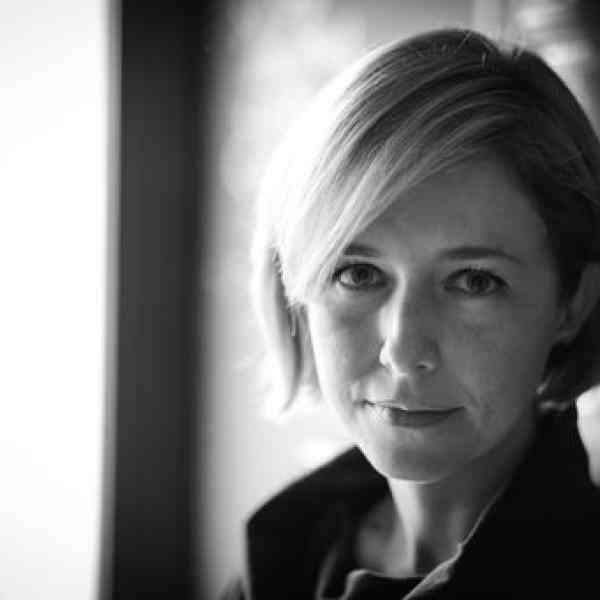Introduction
Diana has developed a new approach that sparks young people’s curiosity and empathy for those with different views and experiences, increases their appetite for complexity and nuance, and continually challenges their unfounded and dangerous sense of certainty produced by – among other forces - algorithmically tailored media consumption.
The New Idea
Diana is rebuilding trust in democracy and championing the central role that Romania’s young people play in protecting it. She positions information as the crucial bridge linking thoughts to meaningful civic action and leverages education, technology, journalistic best practices and youth voices to fortify it for those most at risk of disengagement and disinformation. Her core insight is that resilient democracies have in place an alert system that reliably draws people’s attention to and activates decisive action against authoritarian threats. Journalists have traditionally played their part, but an informed citizenry that embraces its agency and welcomes its shared responsibility has proven the foundation on which this alert system thrives. It is why Diana’s model, Forum Apulum, constructs spaces and processes for young people that prioritize information gathering, normalize its consumption, and then activate civic engagement. Dialogue, self-expression and problem-solving result, leading to a broader, more connected swath of younger Romanians who identify and act as stewards of the country’s democracy.
Identifying as her target audience those aged 18-30 who live in smaller cities and towns, Diana focuses on a population segment often overlooked amidst marked geographical divides. This demographic has also proven particularly at risk of online disinformation campaigns. She combines media literacy trainings in schools with conversations in smaller communities around the country about shared challenges to catalyze young people to act. She leads on the creation of resources about Romania’s past and present and engages partners to help disseminate them. Diana also works alongside young people to launch the youth-led and -curated news sites Gen, știri and Gen Zette on Instagram and TikTok – two of the social media platforms most popular amongst those aged 18-30 – to ensure her target audience remains informed about current events amidst sensational posts from influencers and far right groups. Peer-led editorial decisions and conversations about current issues ensure these platforms’ content is relatable and trustworthy. Diana believes these efforts are critical to building connection and shared reference points across geographies and ideologies amidst the echo chambers that have become standard and isolating for so many digital natives.
With more than 10,000 students and 200 teachers participating in Forum Apulum trainings, with more than three million young people visiting the Gen, știri and Gen Zette platforms each month, and with several mainstream media outlets in Romania and beyond adopting Diana’s approach to better engage younger news consumers, Diana is shifting current systems and creating new ones so that future alerts to democracy’s existential threats are heard loudly and acted upon promptly.
The Problem
Far too many young people in today’s Romania are disengaged from civic spaces. For those aged 18-29, more than half express little or no interest in politics, and only a fifth participate in traditional democratic processes such as joining protests or signing petitions. A disproportionately small number vote in both national and European Union elections, too. This disconnect is especially true for young people living outside the big cities’ bubbles, where economic and educational opportunities are limited. Insufficient mechanisms that invite and act on younger people’s feedback when policies that impact them are made by local and national government compound the problem. And because those aged 18-29 were born after the fall of Ceaușescu and grew up in a country increasingly integrated with the EU, they know only functional democracy and as such are insulated from harms caused by authoritarian rule.
At the same time, fewer younger Romanians access mainstream media outlets to stay on top of current events. They instead get their news from social media platforms such as TikTok and Instagram, which makes younger people more exposed and vulnerable to disinformation campaigns given that Romania ranks second to last in media literacy skills amongst the EU’s 27 countries. Engaging with online news posts offers only the illusion of civic participation and, due to echo chambers and filter bubbles, encourages a false sense of connection and dangerous sense of certainty. Young voices have largely disappeared from public and civic spaces as a result. Distrust of others who subscribe to different views creates additional barriers to dialogue.
There is considerable distrust of mainstream media amongst younger Romanians, as well. They often view journalists as biased and/or influenced by foreign or corporate interests. This perception is particularly strong amongst youth outside the big cities and effectively corrodes foundations of the shared alert system that Diana believes is crucial to sustaining a resilient democracy. A culture of distrust that remains one of the communist era’s most lasting legacies adds yet another barrier to vibrant civic engagement.
Diana has diagnosed even deeper and more troubling roots to these problems in the pernicious common experiences among youth – in Romania and elsewhere – of loneliness, isolation and alienation, all of which propagate the kinds of complacency and disengagement that erode democratic social and political life.
The Strategy
Diana has designed a comprehensive approach to fortifying the country’s alert system for generations to come. She convenes Caravan conversations in communities of all sizes outside big cities to surface shared challenges and catalyze younger people to solve them. She conducts media literacy trainings in partnership with schools and community groups. She engages a team of young people aged 19-26 to run Gen, știri and Gen Zette, thereby ensuring that more younger people consume peer-generated and -presented news about the country’s challenges and opportunities.
Diana leads on Caravan conversations and helps her team of young people grow to take the lead on the discussions. This initiative involves travel to several of Romania’s smaller cities and towns to engage directly with local youth. Schools and public libraries help to publicize the events. Topics of discussion include the importance of voting, opportunities for community activism, and how to spot disinformation. These conversations also surface what matters most to the younger people attending, which highlights what local schools and CSOs can then focus on to cultivate greater civic participation. Conversations add to the Gen, știri team’s understanding of their target audience and what they care about most. To date, more than 1,000 young people across nearly 20 smaller cities and towns have participated in what are essentially one part town hall and one part changemaking incubator.
Diana also works directly with schools to conduct media literacy workshops that engage students in skill-building. These include how to identify credible sources, how misinformation spreads, and how to verify something they read before sharing it with others. This work both complements what teachers and other school staff already focus on and activates them to do even more. Diana has also worked with students and professors at the University of Bucharest. More than 10,000 young people have participated to date, and around 200 of their teachers have also engaged in Diana’s professional media literacy trainings, thereby shifting pedagogy and curricula at more than 30 high schools outside the capital.
It was during one of these Caravan conversations that Diana, together with Teodor Tiță, first came up with the idea for Gen, știri, a project which leverages popular social media platforms Instagram and TikTok to disseminate news stories created by and for younger Romanians living outside the big cities. The model employs a peer-led approach where younger people themselves – all of whom grew up in small towns – decide what topics to focus on, create stories about, and post. Staff are trained in best practices by Diana’s co-founder Teo, himself a respected career journalist who has worked for both domestic and international media outlets. Stories are published daily.
Gen, știri reaches approximately three million unique accounts each month. Of these, 85-90% belong to those under the age of 35, and 65-70% to those under the age of 24. The trust that has been built between the team and its users tackles cynicism and disengagement. The success and reach of Gen, știri led to the launch of an English-language offshoot in March 2024. Also run by those in their 20s, Gen Zette focusses on news stories from Romania and neighboring countries to build the target audience’s knowledge of the region. Nearly 15,000 now follow its Instagram account, with correspondents stretching across 15 countries.
Diana has formed partnerships with journalists and CSOs to build credibility and scale her approach. But she makes clear that those she collaborates with must either work alongside younger people or otherwise center youth voices. Her work with DCN Global, an international community of digital professionals and journalists that Diana collaborates with, has contributed to the launch of Gen Zette and summer training camps for young journalists and activists from across Europe. At the core of all these partnerships is Diana’s skill at relationship- and network-building, which has helped to ensure that more professionals rethink how they engage and address younger peoples’ interests, news consumption habits, and desire for connection.
Other work of Forum Apulum complements these strategies. Gen, revista, a magazine that preceded the founding of Gen, știri, focuses on creative writing and media literacy and serves as a platform for young people to share their stories and perspectives. More than 100 young co-creators have led the magazine’s publication since its launch in 2020. An Illustrated Guide of Romanian Communism, which is intended to help younger people understand the harm communism did amidst revisionist narratives online, has more than 15,000 copies in circulation thanks to partnerships with schools and museums. The Others is a podcast highlighting how young people from different political points of view can dialogue on issues. And "Fake News Hunters" was a project that gathered specialists from Romania, Georgia, Greece, Italy, and Ukraine to analyze the spread of disinformation online during the COVID pandemic.
Diana wants to scale the Gen, știri model. She is also committed to ensuring that the Gen, știri and Gen Zette teams recruit younger Gen Alpha colleagues to mentor and integrate them in the team when the time comes. Diana plans to engage more of her colleagues to host more Caravan conversations, and she eventually wants to invite older Romanians to the conversations to build mentorship opportunities, intergenerational understanding, and shared allegiance to civic stewardship and democratic action.
The Person
Diana's journey is deeply rooted in her experiences growing up in post-communist Romania, where she witnessed significant political and social change. Born in the final years of the Ceaușescu regime, she saw firsthand the impact of political oppression. Her parents, who moved from rural villages to the city and refused to speak with her about the regime, instilled in her the values of resilience and determination. Diana's father was a trained journalist and inspired her early interest in media and storytelling. Her mother helped Diana develop appreciation for education and civic responsibility. But her parents’ preference not to talk politics led Diana to grow up believing that the communist system was best for them and the country.
Diana’s formative years were marked by significant challenges. The fall of communism led to what she calls a brutal shift, as suddenly, those who had praised Ceaușescu for so long were defacing his pictures in public and celebrating his fall. She found the about-face jarring and wondered how much harm such cognitive dissonance had caused. Influential teachers – one in philosophy who showed great care, the other in mathematics who created unnecessary obstacles – challenged Diana to think critically, take initiative, and find solutions on her own. These experiences would help to lay a foundation for her future changemaking.
Diana remembers seeing people of all ages in the streets in 1989 and afterwards, joining hands in support of a new Romania for all. It is why, when she joined sweeping anti-corruption protests in 2015 and 2017, she was struck by those who were missing from the crowds. The majority of the protesters were over 30 years old. She spoke with friends about how much this worried her. Who would ensure that future governments were held to account if Romania’s youth were not engaged? How would a return to authoritarianism be stopped? Diana's work as a journalist and changemaker exposed her to disinformation and the critical need for both civic awareness and media literacy amongst younger and older segments of the Romanian population. She recognized that without proper education and engagement, younger people were at risk of becoming "civic ghosts," disconnected from the civic processes that keep democracy in place. She founded Forum Apulum shortly thereafter, and her workshops across Romania allowed her to connect with young people on a personal level, understanding their struggles and aspirations. They also reinforced her commitment to enabling them to become informed and active citizens.
Diana has since leveraged her professional experience to create platforms that engage young people in meaningful ways. Her innovative approach aims to bridge the gap between personal experience and civic education, particularly for those living outside the big cities’ bubbles. Forum Apulum and more recently Gen, știri are not just about providing information about current events in accessible ways. They are fundamentally about establishing the spaces and instigating the processes for young people to connect across otherwise polarized and isolated orbits. By cultivating a sense of trust in each other and in the integrity of core civic institutions, Diana is enabling robust youth involvement in the democratic praxes they are tasked with strengthening.




